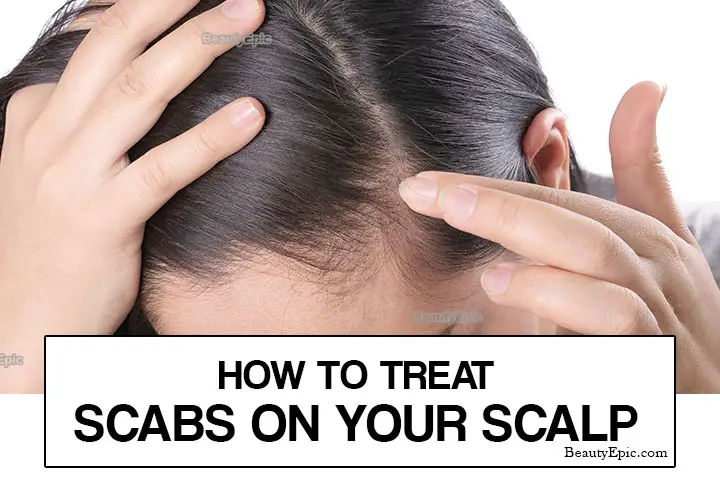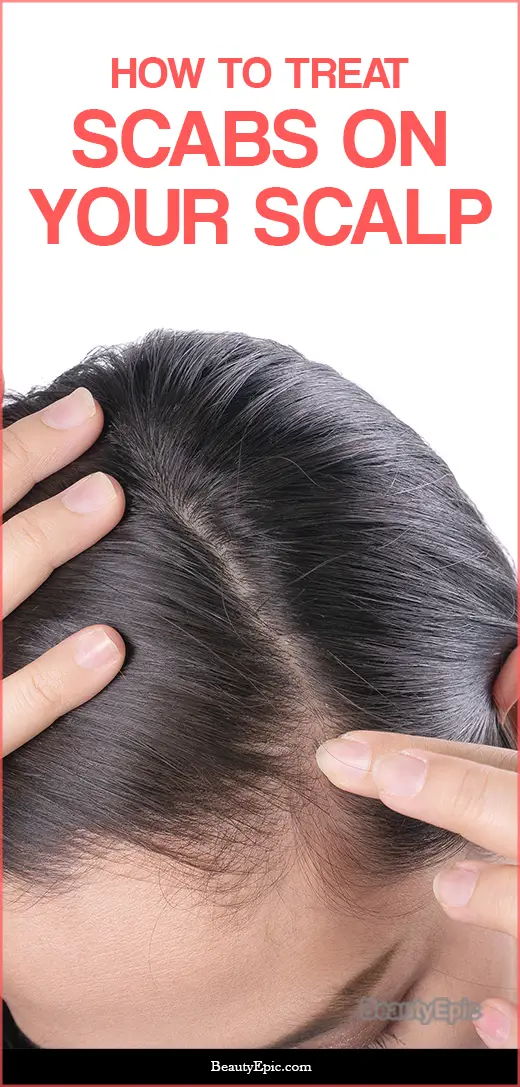
Important: This article is for informational purposes only. Please read our full disclaimer for more details.
That constant itchy sensation on the scalp which is embarrassing and irritating is a result of a condition known as scabs. Scabs on the scalp can indeed be a pain. Scabs are flakes of dead skin that form hard clusters on the scalp. Itching this area can aggravate the infection and cause them to spread even more.
Causes of Scabs on Scalp?
- Contact Dermatitis: Contact Dermatitis is an allergic reaction to something that you have touched. It could be a metal, beauty products, cloth materials, latex, plants or any substance to which your body reacts and causes itchiness. The allergy causes dry itchy patches on the scalp.(1)
- Seborrheic Dermatitis: Known as dandruff in common terms, this dermatitis condition leads to dry crusty patches on the skin. The dandruff flakes attach to the scalp and spread to various areas on the scalp, however, it is not contagious. Even after being treated, dandruff could have a tendency to recur.(2)
- Scalp Psoriasis: Scalp Psoriasis causes thick grey patches on the scalp and is non-contagious. It occurs due to an underactive immune system.(3)
- Ringworm: This is an infection that causes red circular marks on the scalp.(4)
- Head Lice: This condition should be addressed as soon as possible as lice are highly contagious and cause severe itching. Lice multiply at lightning speed, look unsightly, and the constant itching can lead to thick scabs on the scalp.(5)
- Eosinophilic Folliculitis: This condition affects people who have Aids/HIV positive. Pus-filled sores appear on the scalp which forms hard crusts/scabs once they start healing.(6)
- Oily Scalp: People who have oily scalp are more prone to dandruff. Constant scratching of the scalp leads to its spreading to the other parts of the scalp.
- Lichen Planopilaris: This is an inflammatory condition which starts with red and purple bumps on the scalp. This condition eventually leads to alopecia(hair loss).
- Shingles: Hailing from the chicken pox family, shingles impact the scalp in the form of yellow blisters. This is a virus that can cause itching and irritation, which further leads to crusty scabs on the scalp.
Scabs on the scalp can be very irritating and should be tackled at the earliest. If the scabs occur repeatedly at one spot on the scalp, get them checked by the doctor. It could be a sign of melanoma and requires immediate treatment.
How to Treat Scabs on The Scalp
Warm Compress
If your scabs do not seem to soften, a warm compress will be beneficial and soothe your scalp from the constant itching.
What you need: a large towel, warm water
How to do: Take a large towel and soak in warm water. Squeeze out the excess water and wrap the towel around the head for 15 minutes. The scabs will become softer and you can slowly comb them out.
Repetitions: Repeat every week till the scabs are off your scalp.
[ Read: How to Use Tea Tree Oil for Scalp ]
Aloe Vera Gel
Aloe gel has anti-inflammatory, healing, and soothing properties that reduce itching and irritation.
What you need:
- One aloe leaf,
- 2 vitamin E capsules
How to do: Mix the juice of one aloe leaf with the oil of two vitamin E capsules. Apply the juice all over the scalp and leave for an hour. Wash with a mild shampoo.
Repetitions: You can repeat this remedy 2-3 times a week.
[ Read: How to Use Castor oil for Scalp ]
Lemon Juice
Lemon works very well for all kinds of scalp infections and has soothing properties. Since lemon can harshly react with the skin.
What you need:
- 1.5 tsp lemon juice,
- 1 tsp olive oil
How to do: You should mix it with a carrier oil before application. Mix lemon juice in warm olive oil and apply all over the scalp. Wash after half an hour.
Repetitions: Repeat once or twice a week.
[ Read: Is Olive Oil Good for Your Scalp ]
Jojoba oil
Jojoba oil has soothing properties and will nourish the scalp well. It will nourish your hair follicles, hydrate the skin, loosen the scabs and reduce irritability.
What you need: a few drops of Jojoba oil
How to do: Massage jojoba oil all over the scalp. Wash after an hour.
Repetitions: Repeat 2-3 times a week.
Neem Leaves
Neem has anti-bacterial and anti-allergic properties and works well in treating infections and itchiness.
What you need:
- 15 neem leaves
- two cups of water
How to do: Boil the neem leaves in two cups of water and cool. Strain and use the mixture to massage the scalp and leave for an hour. Wash your hair.
Repetitions: Repeat twice every week.
Apple Cider Vinegar
Apple cider has anti fungal and soothing properties that provide relief from itchy scalp and infections.
What you need:
- 2 tbsp apple cider vinegar,
- 1 cup warm water
How to do: Mix the apple cider vinegar with a cup of warm water and apply all over the scalp. Rinse after an hour.
Repetitions: Repeat twice every week.
[ Read: How to Use Apple Cider Vinegar for Hair ]
Coconut oil
Coconut oil has antibacterial and anti-inflammatory properties, that heal the skin and prevent it from spreading to the other parts of the scalp. Also, coconut oil balances the moisture levels of the skin and hydrates the skin well. Coconut oil also helps in getting rid of excess sebum on the scalp.
What you need:
- some coconut oil
- towel
- warm water
How to do: Apply the coconut oil and cover your scalp with a towel dipped in warm water. Make sure that the excess warm has been drained out from the towel. Leave for an hour. Rinse hair with a mild shampoo.
Repetitions: Repeat twice a week.
[ Read: How to Use Coconut oil for Dry Hair ]
Tea Tree oil
Tea tree oil has antibacterial and anti fungal properties that help in combating infections and soothe itchy skin.
What you need:
- 1 tsp tea tree oil
- 2 tsp almond oil
How to do: Mix the tea tree oil with almond oil and apply on the scalp. Wash with a mild shampoo after an hour.
Repetitions: You can repeat it thrice a week.
[ Read: How to Use Coconut oil for Hair ]
Oatmeal
Oatmeal has extremely effective soothing and healing properties and it is anti-inflammatory in nature. Some people who suffer from skin allergies also add oatmeal to their bath. It relieves the skin from all sorts of irritation and itching.
What you need:
- 2 tbsp uncooked oatmeal,
- water
How to do: Mix oatmeal with water to make a thick paste and apply it all over the scalp. Leave for an hour and rinse with a mild shampoo.
Repetitions: Repeat twice a week.
Olive oil
What you need- 2 tbsp olive oil
How to do: Warm some olive oil in a microwave and massage it on your scalp. You can leave it overnight or wash it after an hour. Love oil has moisturizing properties that hydrate the scalp and loosens the scabs. Follow this remedy 1-2 times a week for effective results.
The above-mentioned remedies are natural tips that you can try out at home without incurring any expenses. However, if the condition does not seem to improve or gets worse over time, you should immediately consult your healthcare provider.
You Might Also Like:
- 10 Best Dermatologists in Bangalore
- Top 10 Hair Transplant Specialists in Delhi
- The 12 Beauty Benefits of Egg Yolk for Your Hair and Skin
- 14 Surprising Beauty Benefits of Baking Soda You Must Know!
- 4 Best Homemade Coffee Scrubs for Skin Whitening
- Why Is My Scalp Lighter Than My Skin?
- How Often Should You Oil Your Scalp?
- How to Do Coconut Oil Hair Mask
- 7 Best Moisturizers For Scalp
- 7 Best Shampoos For Folliculitis
















